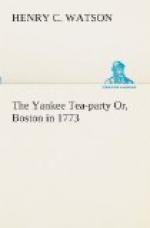“Perhaps,” said Hand, coming to the rescue of his hero, “a desperate measure was necessary. I’ve heard that at the time, Lord Rawdon was marching very rapidly to relieve the garrison, and Colonel Lee thought that every means should be tried to reduce the Fort ere the siege was abandoned.”
“You say well,” said Kinnison. “As I said before, we should never judge commanders without knowing the facts of the case. Never say a man has committed a fault, unless it sticks out plain to the eye. Harry Lee was as a common thing very sparing of the lives of his men, and he never made any military movement without very strong driving from reason, as General Greene himself would have told you. Whaling was a brave man and a strict soldier, or he would never have dared to approach the fort in such a way. But as I said before, they were all daring men that belonged to Lee’s Legion. There were two soldiers of the cavalry, named Bulkley and Newman, who had been the warmest and the closest friends from infancy. They had both joined the army at the same time—that is, at the commencement of the war; and through the greater part of the southern campaign, they fought side by side, and each one strove to lighten the sufferings of the other. Brothers could not have been more attached to each other. In the fight at Quimby, where Captain Armstrong made a famous dragoon charge upon the 19th British regiment, the friends were among the foremost. The dragoons had to pass a bridge in which the enemy had made a large gap. Captain Armstrong led the way, but not more than a dozen men followed, to support him. At the head of this little band, Armstrong cut his way through the entire British regiment. But then a well-aimed fire brought down several of the dragoons. Bulkley and Newman were mortally wounded at the same fire, and fell, locked in each other’s arms.”
“A kind of Damon and Pythias friendship,” observed Hand.
“Yes, I believe they would have died for each other,” said Kinnison. “A friend told me that they were never separated, in camp or field. If one was sick, the other watched by his side. I had a comrade of the same kind during the greater part of my life; his name was Williams, and he was one of the best-hearted men I ever knew. We fought through the Revolution together, and both entered the army in 1812. But I lost him during the attack on Fort Erie. Poor Williams was killed by a shell. It has been a long while since then, but I still feel as if I had lost a part of my heart when he fell. Poor Williams!” and Kinnison appeared to be busy with the mournful recollections of the “friends of his better days.”
“Well, you may talk as much as you please about Henry Lee and Marion, and your other men in the south,” said Ransom, “but John Stark or Ethan Allen was worth as much as either of them.”
“My favourite leader was Mad Anthony Wayne,” said Colson. “A better soldier or a more wide-awake general was not to be found in the army during the revolution.”




